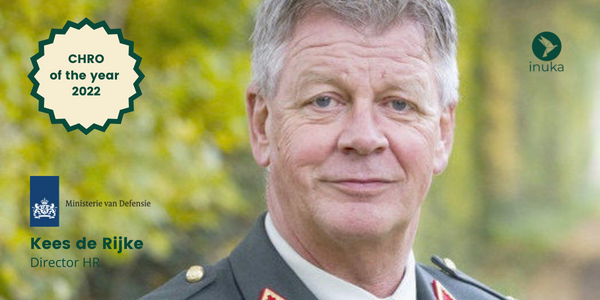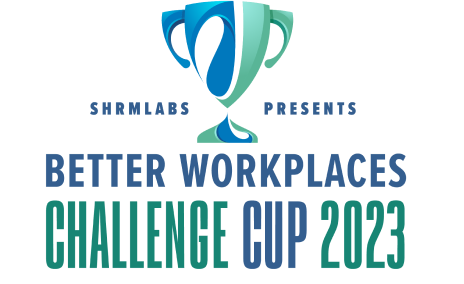General Kees de Rijke, CHRO of the year 2022, on prevention and vitality in the Dutch Army Groundforces

General Kees de Rijke, HR director of the year 2022, on prevention and vitality in the Dutch Army Groundforces
On the eve of his resignation, being named HR Director of the Year; that sounds like the icing on the cake! This happened to General Kees de Rijke this year. De Rijke has a great track record; with his 41 years of service with the Dutch Army Ground forces, he has been deployed to Bosnia and Afghanistan, and is responsible for 22,000 employees, reservists and veterans as HR Director of the Royal Dutch Army.
Robin van Dalen, CEO and co-founder of Inuka Coaching took time to explore De Rijke’s insights on key success factors. This interview forms a part of a Well-being Leadership interview series, in order to learn from recognised best-practice experts. Based on the Inuka mission ‘resilience for everyone’, she explores different angles on how to ensure employee vitality and prevent employee drop-out, absenteeism and burnout.
To begin with, how should we view the army ground forces in the context of other organisations?
We function truly differently to civil organisations, especially in our core task: we start where others stop. We are the ‘emergency solution’ so to speak, being mobilised if the police force does not work or if war breaks out. However, we do have entities within our own organisation that also exist in civil society: we have our own engineers, construction company, university, health care system and even our own hospital. We are in fact a mini society.

What can leaders of "mainstream" organisations learn from the army?
How you keep your people with you, even if – like the army – you don’t pay well, and people risk their lives. You don’t only keep people with you from financial rewards, or through experiences. What makes the difference is inspiring your people. The reason we go on a mission to Afghanistan is not only because the general or the king says so. Not only for the salary either. I’m going because my buddy is going. We don’t let each other down. Togetherness, camaraderie. And that’s why I’ve been here for 41 years!
“You don’t only keep people with you from financial rewards, or through experiences. What makes the difference is inspiring your people.”

Sending employees to a war in Afghanistan is not something regular organisations do. How do you think HR leaders can create the inspiration you are referring to?
I regularly speak with HR leaders and see several themes catching on. First, give people meaning. Make sure the team is on the same page, experience projects and missions together. You are not just part of a team, you contribute to the team and it’s outcomes. Give them that purpose.
Second, always have two people at the top, with one setting the course and one taking care of the people. In the army, you have the commander and the deputy. The commander sets the course, and the deputy runs the team and the people. The deputy is really interested in the person behind the army suit, what is going on at home and when does home need to be involved? For example, to send flowers at a 5 year wedding anniversary. Send a postcard for important milestones in someone’s life. These are little things you can be aware off. It’s very easy to organise, but I hardly see it happening at other organisations.
Third, give confidence, especially in crisis. When corporate organisations have a crisis, you see that everything is immediately centralised. With us, it’s the other way around. In war, the greatest possible crisis you can imagine, most responsibility is placed at the lowest level. Whereas companies tend to control and that takes away trust. Last but not least, take care of your people. We have many instruments for this, both preventive and curative. Leadership is very important here. Put your heart in it, that also contributes to inspiration.

Let's talk a little bit more about prevention, what's your take on that?
Prevention is a big trend and extremely important to us. Everything starts with you being able to do your job well. Practice, practice and train. Build on creating confidence so that you can blindly trust each other. Being able to respond and sense each other is the most important thing, and being able to deal with deviations if things go differently than expected. By training that way, you a become more resilient in acute situations. Mental fitness is very important here. How do you get that mental fitness? It starts with motivation, with being passionate about your profession. In addition, we learn self-regulation. Both medically and mentally. We used to call it self-help and comrade help. If you experience something, we make sure there is always someone you can immediately talk with. So, during a mission, that might be a comrade, or a spiritual caregiver.

How is the organisation geared towards health and well-being?
We have set up a baseline and a 1st line for this. The baseline is about being able to talk to someone when things are not going well. For example, we have a life coach in every team, we have pastors and even imams. We have trained about 1,000 people over the past three years to be able to coach colleagues in the field of physical and mental health, the comrade help I mentioned earlier. We can now speak from practice that this works. Everyone is supportive, the teams are close-knit and are alert to signals from each other.
The 1st line is the medical line, the psychologists, company social workers and doctors. We have everything mapped out and a solution for everything: we have 23 ‘counters’ including inclusivity, PTSD, diversity, collegial network, spiritual care, and more.

That sounds really well organised. Are there still points for improvement?
There are several things that we could optimise. We see that people who are not doing well have difficulty finding their way to the right counter. I already mentioned that we have 23 of them, that’s a lot. People can’t see the wood for the trees. Two marines who dealt with PTSD themselves are now working there. It’s called Project KNAK, and the goal is to set up a kind of triage above the baseline, where people can talk and then be referred to the right counter.
Another point of improvement is to break the stigma. The taboo on seeking help is very present; people are afraid of a getting a stamp, a blemish on their file if they are transparent on their mental state. You need role models like Robin Imthorn who share their story. But you also need self-awareness and recognition. That is the first. I notice that there are still many gaps to fill. And that brings me to self-regulation, in which we are also optimising. That means that you must empower people to recognise and take action themselves. That’s what I found interesting about what you do with Inuka: creating space for what you can do yourself. That you can recognise and take action directly.

What is the biggest challenge in terms of prevention?
That is building the framework, installing processes at the front end that focus on vitality in order to prevent people falling out. We need to ensure that someone is, and remains mentally fit. This is something we have been working on of the last five years, this shift towards prevention. For example, we ran into the problem that veterans who experience issues ran into the wall. Many of them are active in the army in all kinds of civilian positions but have been dealing with issues for too long. What you want is to prevent issues from compounding or escalating, by identifying and acknowledging them in an early stage. Especially the acknowledgement part is important, people often know that things are not going well, but do not recognise this a serious sign and therefore just move on and struggle. That means we have to help people on the front end, before they leave for a mission: what are the signals that I can recognise when things are not going well; how do I deal with traumas; how do I stay healthy? The goal is to make all organisations within the army aware of how you become fit before action and how do you stay fit after action? Self-regulation is again the theme. Someone may have run an excellent mission, but once home, could be incapable of working. You want to prevent that!
“Especially the acknowledgement part is important, people often know that things are not going well, but do not recognise this a serious sign and therefore just move on and struggle.”

How do you keep learning yourself?
By reading a lot, through seminars, and sharing practices with peers. That’s my job. Apparently, I am one of the forerunners myself. I feel like an adventurer. Vitality is the sexy word right now. What I find interesting is to see how other organisations deal with vitality, with a holistic approach. For example, this interview already gives a bit of awareness, which I think is important.

Do you get your inspiration from books?
No, not really. I mainly learn from talking to each other, as HR leaders, learning from each other. Very practical actually.

Another practical tip to end with: suppose a HR director wants to get started with prevention and vitality. Do you have any recommendations on how to make the business case?
Yes, I can be very clear about that: The business case is, ‘it costs you money because you miss people’. Most organisations currently have 10, 20, 30% unfilled vacancies. That means you have money left over that you had reserved for salaries. And in the meantime, 80% of your people may be doing 100% of the work. So, take good care of that 80%! Spend the 20% you save on vitality programs, on automation of work, reducing the work for your people. I hire a lot of temporary workers for example and give my employees the latest phones. But above all: well-being and happiness at work is more than financially rewarding them, it is about inspiring. Help them to grow; as a person and as a professional!
“80% of people now do 100% of the work. Take good care of that 80%! Spend the 20% you spend less on salaries, on vitality programs, on job relief and give your people the latest phone.”

Did you like this interview?
Find more interviews with business leaders of various top companies via the button below. Would you like to receive the next interviews in your inbox? You can register below.
Powered by Inuka Coaching, a #BCorp and value-driven organisation. With our roots in research, we lead on evidence-based, digital and data-driven solutions that achieve measurable impact in employee vitality and resilience.
As part of our mission ‘Everyone resilient’, we strive to bring valuable content to advance the strategic thinking in employee well-being and facilitate a vibrant and growing peer network of leaders, because we all learn faster and achieve more together! Join our peer network of leaders focused on Well-being, register here
Find this post interesting? Share it with your connections!



